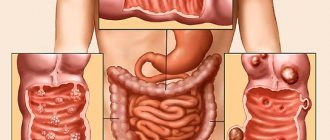Factors causing constipation with gastritis
When difficulties arise with bowel movements, the causes are many diseases and pathologies. This symptom occurs not only due to gastritis, but also due to diseases of other internal organs.
Constipation due to inflammation of the gastric mucosa occurs as a result of a complication of the underlying pathology. When gastritis goes into remission, the unpleasant symptom is forgotten for a while. The main causes of constipation are:
- eating rice cereals;
- products that contain starch in large quantities;
- bakery products made from rye flour;
- hot drinks;
- some fruits, such as pears.
Foods that are included in a therapeutic diet begin to provoke constipation. They are aimed at slowing down the motility of the digestive organ. With gastritis, constipation is caused by sweets and quinces. The discomfort continues for 3 days. The patient is unable to go to the toilet normally.
With increased acidity of gastric juice
Constipation in gastritis with high acidity is considered a rare manifestation. Difficulty in defecation occurs due to overeating, bad habits and consumption of certain foods. Neglecting therapeutic recommendations leads to constipation. Under some circumstances, the symptom becomes the cause of a stomach ulcer.
The patient feels that the discomfort is quickly eliminated. A person naively assumes that undigested food will dissolve in gastric juice. However, the symptom will appear frequently and be severe. Hydrochloric acid will begin to fail to cope with the processing process. As a result, fermentation of products in the intestines will develop. This leads to gas formation and bloating in the stomach.
With atrophic gastritis
Constipation with atrophic gastritis is treated starting with the underlying disease. First of all, the gastroenterologist prescribes medications that are aimed at reducing or increasing acidity. In case of antral atrophic gastritis, the use of traditional medicine and self-medication is categorically excluded. This will cause additional harm to the body.
After eliminating the underlying disease, constipation is treated. The doctor orders an examination of the intestines. For this, the patient undergoes special tests. You can’t do gastric lavage at home, and you can’t take medications for constipation. Treatment of discomfort is carried out under the supervision of the attending physician.
In chronic form of the disease
Difficulties in bowel movements occur due to poor nutrition. The process occurs due to the small volume of plant food. This leads to difficulty in defecation during gastritis. The digestive organ stops digesting foods that contain coarse fibers.
In chronic gastritis, difficulty in defecation occurs due to intestinal irritation. In most cases, it manifests itself as a result of inflammatory processes within the body. Irritable bowel syndrome occurs after taking laxatives. Patients begin to use drugs in large quantities if the results are not justified. Before using laxative medications, you must carefully read the instructions.
Reasons for this problem
Difficulty with bowel movements can occur due to many factors. And this phenomenon is promoted not only by gastritis itself, but also by other diseases that develop inside the body.
A characteristic feature of such constipation is that it appears during complications of the underlying illness. But during remission, a person for a certain period may completely forget about the existence of such a sensitive problem.
The above factor clearly indicates that before starting to take laxatives, it is necessary to organize the correct treatment of the existing disease.
The main reasons that provoke the development of constipation in chronic gastritis:
- Wrong food. A diet in which plant foods occupy a small volume can contribute to difficulty in bowel movement. The organ stops processing food containing coarse fibers, which leads to its dysfunction. To eliminate this particular reason, it is necessary to remove easily digestible carbohydrates from the daily menu.
- Irritable bowel syndrome. It often develops against the background of inflammatory processes occurring inside the body, and sometimes it can act as an independent disease. This syndrome can also occur due to taking a large number of laxative medications.
As for the first cause of constipation, it also becomes the culprit of gastritis itself. And all because the typical diet of a sick person mainly consists of foods that provoke slow intestinal motility. This is for example:
- rice cereal;
- foods high in starch;
- bread and other baked goods made from light flour;
- some hot drinks, including cocoa;
- pears.
Frequent consumption of sweets, chocolate, bird cherry and quince also leads to such stool disturbances. And when a person encounters such a problem, he begins to experience significant discomfort, not being able to go to the toilet normally for three days.
In this case, the walls of the stomach can become inflamed, causing pain. We'll tell you what to do in this case and how to treat constipation with gastritis.
Methods for treating an unpleasant symptom
After diagnosing the disease, a treatment regimen is prescribed. A gastroenterologist gives recommendations on the introduction of dietary nutrition. The main goal in the treatment of gastritis is to eliminate the underlying disease. However, when constipation occurs, treatment is aimed at preventing the unpleasant symptom. Therefore, drug therapy includes drugs with a laxative effect.
Prescribed drugs that accelerate intestinal motility, soften stool or increase the amount of excrement. Some expensive products are replaced with analogues. If you can’t afford candles, it is recommended to use Vaseline oil. Depending on the course of gastritis, methods and means of treating this unpleasant symptom differ.
Diet food
Using a diet for constipation involves preventing inflammatory processes in the stomach. Proper nutrition will improve your digestion. This will affect the emptying of the rectum. The patient will no longer be afraid of the process of defecation. To eliminate problems with stool, you should consume:
- bran from rye and wheat grains;
- fruits and boiled vegetables with skin;
- homemade yogurt;
- low-fat kefir;
- leaven.
The doctor advises drinking only fresh berry compotes or herbal decoctions. Before drinking, you should pay attention to the temperature of these drinks. For constipation and gastritis, you should drink liquid at room temperature.
If emptying the colon due to gastritis is difficult and this continues for more than 3 days, then use castor oil in a volume of 5 drops. The product copes with the softening of feces. When eating food, you must chew it thoroughly. This will help the intestines digest foods faster.
What to do if constipation occurs with gastritis?
Constipation due to gastritis is treated with medications or traditional medicine that have a laxative effect.
List of drugs:
- Stool softeners (Vaseline oil, glycerin suppositories, Duphalac).
- Stabilizing intestinal motility (“Dulcolax”, “Guttalax”, thick senna extract).
- Increasing the volume of feces (magnesium sulfate, lactulose, microenemas).
If surgery was performed on the organs of the digestive system before treatment, it is necessary to consult with a surgeon to find out the possible consequences of taking medications. The effectiveness of laxatives depends on the dosage determined for each person individually. If there is no bowel movement for several days, then laxatives are powerless.
In this case, an enema is done with warm water and the addition of two tablespoons of sunflower oil to avoid damage to the rectum. The volume of water in the enema ranges from 0.5 to 1 liter.
Causes
Very often, gastritis and constipation can develop simultaneously due to the following reasons:
- Unbalanced diet. Under the influence of junk food, the delicate mucous membrane of the stomach is gradually destroyed, and an inflammatory process called gastritis develops. Ultimately, the digestive process and timely elimination of toxins from the body are suspended. Frequent consumption of alcohol, fast foods, and processed foods lead to various diseases of the digestive system. A diet menu developed by a doctor will help solve the problem.
- Serious treatment with strong drugs can damage the lining of the digestive tract and cause ulcers. Against the background of the inflammatory process, the regular emptying of the digestive tract of waste is suspended.
Causes of gastritis with constipation
Fecal stagnation is a common problem in people suffering from inflammation of the gastric mucosa. The reason for this is simple: due to improper processing of food, undigested foods enter the intestines. Since they are in an unusual form, it is difficult for the intestines to process them and form normal feces.
Gastritis, accompanied by constipation, can occur due to several reasons. Poor nutrition. Failure to follow a diet, consumption of large amounts of alcohol, dry flour products, spicy and fried foods, refusal of vegetables and fruits cause irritation of the gastric mucosa. Constipation becomes a side symptom of gastritis, because the intestines have to perform partial functions of the stomach, but it is not capable of this. The feces become hard, are poorly processed and move slowly through the intestines.
Increased stomach acidity can also cause gastritis with constipation.
In this case, some insignificant factor may become a provocateur of the disease:
- smoking;
- drinking alcohol;
- stress;
- hunger strikes or strict diets;
- binge eating.
An unhealthy lifestyle puts a lot of stress on the intestines, which disrupts the digestion function and causes constipation.
In this case, the stomach is subjected to heavy load, its mucous membrane becomes inflamed and the digestive function is disrupted. Constipation becomes the first symptom that people with high acidity prefer not to pay attention to, believing that this is a temporary phenomenon due to the same stress and will soon pass. Not suspecting that the problem lies much deeper.
Intestinal diseases. The most common symptom of constipation is irritable bowel syndrome. This pathology affects intestinal motility, leading to severe spasms, and can also provoke inflammation of the stomach.
In this case, hard stools and rare bowel movements, along with gastritis, are side symptoms of the disease.
We recently wrote about how to soften stool in adults and children.
Drug treatment
Constipation due to gastritis with high acidity is treated by taking laxatives.
It is worth highlighting the following types of popular remedies for constipation:
- Stimulate the activity of the intestinal muscular system (senna grass, Dulcolax, Guttalax).
- Soften solid masses in the system (glycerin suppositories, Vaseline-based preparations, Duphalac).
- Accelerate the process of cleansing the intestines from solid fecal tumors (rectal microenemas, lactulose). It is recommended to use an enema only in an emergency, when you quickly need to remove fecal stones from the body.
Other recommendations
It should be remembered that physical inactivity increases the risk of constipation with gastritis. Therefore, patients with this diagnosis need to regularly exercise, swim or run. Physical activity should be moderate. If stool retention bothers a person for more than 3 days, and maintaining proper nutrition does not improve well-being, it is necessary to take a small dose of castor oil. The product not only helps ease the process of defecation, but also prevents the formation of cracks. There are also several medications with a laxative effect (“Slabilen”, “Microlax”, “Duphalak”, “Regulax”). However, you should take medications only as prescribed by your doctor. It is highly undesirable to exceed the recommended amount of the drug.
Treatment at home
Constipation due to gastritis can be eliminated using home methods using a diet menu and traditional medicine advice. If the acidity of the stomach is increased, gastritis and constipation are treated only under the supervision of a doctor using safe methods.
Increased fiber
As you know, fiber is not absorbed in the body, but it increases in size, quickly removing waste and toxins. That is why nutritionists recommend choosing products with coarse fibers so as not to have digestive problems.
The dietary menu should include porridge, fresh or stewed vegetables, herbs, flax seeds, fennel or dill. In case of high acidity, products should be selected as carefully as possible, taking into account all the doctor’s advice.
Traditional methods of treatment
Only under the supervision of a doctor can constipation due to gastritis be treated using traditional medicine recipes.
There are several simple and effective methods:
- Dried fruits have laxative properties and have virtually no prohibitions. For the best effect, it is recommended to chop dried fruits and pour honey over them. Keep the resulting mixture in the refrigerator and take one spoon before breakfast to restore the natural process of bowel movements during gastritis.
- Plantain or dill seeds. You can buy ready-made preparations at the pharmacy or steam the seeds yourself in a glass of water. Strain and take one spoonful on an empty stomach.
- To soften hard fecal formations in the intestines, it is useful to drink vegetable oil on an empty stomach; you can add it to dishes and juices.
- Senna grass. This medicinal plant stimulates the digestive system, accelerating the process of cleansing the body of toxins. However, there are serious contraindications that should be familiarized with before starting treatment.
Applications of flax seeds
The seeds contain a large volume of coarse fibers, which quickly remove solid fecal tumors from the body. The seeds can be added to food or medicinal mixtures can be prepared based on them. To do this, pour a spoonful of seeds into a glass of hot water, infuse it in a thermos, filter it and take one spoonful before meals until a stable stool is completely restored.
Honey has unique substances that have a positive effect on the functioning of the gastrointestinal tract. That is why it is used in folk recipes to treat constipation.
It is recommended to start the morning with a glass of water with honey. It is useful to add honey to porridges and desserts, or prepare a mixture with dried fruits. There is a serious contraindication, namely an allergic reaction to natural honey. That is why it is not recommended to give it to small children and pregnant women if there is a risk of adverse reactions.
Banana
This is a unique fruit that simultaneously has a fastening and laxative effect. To treat constipation, you need to choose only ripe fruits, the peel of which is already beginning to turn black. However, green bananas, on the contrary, contain a large amount of starch, which can cause constipation.
Bananas contain low levels of acid, so they can be consumed for gastritis and other stomach diseases. The high content of potassium and magnesium has a beneficial effect on the process of absorption of healing substances from foods.
Prevention
To avoid the simultaneous development of gastritis and constipation, you need to adhere to the following basic principles:
- A dietary menu that should include foods with low acidity and high amounts of fiber.
- Between meals, you should not forget about water if you are not prone to swelling.
- You need to exercise every day. It is useful to run, swim or dance. The main thing is to train the abdominal muscles, which are responsible for the regular process of digesting food.
- After long-term hospital treatment, it is imperative to restore the optimal level of beneficial microflora in the stomach with the help of preparations with live bacteria.
Getting rid of constipation due to gastritis
Every person at least once in his life has experienced a manifestation of a disease called “gastritis”, which is accompanied by unpleasant symptoms, including constipation. Constipation with gastritis is a fairly common occurrence, causing a lot of inconvenience and discomfort, which you want to get rid of as quickly as possible. How to do this without any risk to health? This question is relevant among those who suffer from gastritis complicated by stool retention.
There are several safe ways to solve this problem. We will talk about them and the reasons for constipation with gastritis below.
How does constipation occur?
Pathological processes occurring in the stomach affect intestinal activity. Therefore, the frequency of bowel movements and the appearance of stool (shape, color) may change. Constipation with gastritis is one of the common manifestations of dysfunction of the gastrointestinal tract. If the cause of the pathology is not determined, treatment of stool retention with medications will be ineffective. When the stomach malfunctions, insufficiently processed food enters the intestines. It is difficult for this organ to digest it completely. Consequently, defecation is delayed. With chronic gastritis, constipation can occur if the patient neglects the doctor's recommendations, does not take medications on time and does not adhere to the correct diet.
Causes of constipation with gastritis
Gastritis is an inflammation of the gastric mucosa, which is accompanied by symptoms - pain, nausea, bloating, heaviness in the abdomen, diarrhea or constipation. The latter is a fairly common occurrence with gastritis.
Before we talk about the causes of constipation due to inflammation of the gastric mucosa, I would like to clarify what constipation is. Each person's intestines are cleansed according to an individual program. For some, it is enough to go once every three days, while others need to do this several times a day. If there is a violation of the usual bowel movements, then we can assume that constipation occurs.
During an exacerbation of gastritis, constipation is a frequent and uninvited guest, the causes of which, as a rule, are the same reasons that caused the exacerbation of the disease. These include:
- Errors in nutrition. Insufficient amount of fluid consumed, lack of vegetables and fruits, consumption of foods that are astringent or slow down intestinal motility (rice, white bread, potato flour, starch, strong tea, cocoa, etc.), fast food, especially if it is consumed dry while running - all these factors directly influence the development of gastritis or its exacerbation.
- Taking large amounts of medications can also cause bowel irregularities. These disorders occur when taking diuretics, antispasmodics, nitrates, antidepressants, etc.
Exercises for constipation
Physical activity and walking help relieve constipation. Gymnastic exercises are done daily for several minutes.
Exercise 1
To relieve constipation, stand up straight, raise your arms up and inhale as much air as possible.
We bend our legs at the knees, lower our hands with our elbows on our stomachs, and sharply exhale air. If the exercise is performed several times a day, the disorder will go away.
Exercise 2
Lie on the floor with your feet off the floor for 10 minutes. Repeat the exercise until you have enough strength.
The well-known exercises “bicycle” and “scissors” help eliminate constipation.
Of course, treating constipation with gastritis at home will not eliminate the primary disease. The listed methods are used as an addition to the main therapy. However, if you eat foods rich in fiber, drink herbal infusions and decoctions, and engage in physical therapy, you will be able to cope with constipation much faster.
How to get rid of constipation with gastritis, recommendations
By following these simple rules, you can ease the course of the disease, relieving yourself of the discomfort caused by constipation. What to do if constipation occurs with gastritis:
- Increase the daily amount of fluid consumed, the volume of which should be at least 5 glasses per day. In addition to water, it is advisable to add low-fat fermented milk products (kefir, cottage cheese, yogurt) to the diet if their use is approved by the doctor. If constipation occurs due to gastritis with high acidity, then it is better not to consume these products.
- Avoid foods that are difficult for the stomach (bread, flour products, chocolate, sweets, fried, spicy, salty and smoked foods, beans, potatoes, cabbage, etc.) All these foods are difficult to digest due to their content and can cause problems with digestion, including inflammation of the gastric mucosa, which leads to constipation.
- Increase the consumption of vegetables and fruits that contribute to the natural cleansing of the body - beets, plums, especially prunes, black currants, apples, apricots, peaches, etc. Including these products in the daily diet will have a beneficial effect on intestinal function.
- Add as much fiber as possible to your diet, which is found in various cereals. Just don’t eat rice porridge, which is more likely to be useful for diarrhea than for constipation. You can add a small amount of butter to the finished porridge, which will also help ease the bowel movement process. Bran is very useful. They help cleanse not only the intestines, but the entire body.
- Slow intestinal motility can be caused by a sedentary lifestyle. Walking in the fresh air and simple exercise will help normalize intestinal activity and relieve constipation.
How to relieve the condition of a patient suffering from constipation
Eliminating systematic constipation is problematic. Below are recommendations that allow you to partially get rid of the malaise.
Increased fiber
You will need to take porridge other than rice - rice has a binding property. Add a little oil to the porridge. Wheatgrass contains fiber. Cereals are sprouted:
- For treatment, take 50 g of wheat seeds, rinse, and place in a glass container. Add water at room temperature to the container and cover with a clean napkin. Place the container with the seeds in a dark place for a day and a half. The wheat will sprout.
- The seeds are washed well and ground in a meat grinder.
- A little boiled chilled water, oil and salt are added to the resulting mixture.
The resulting pulp is eaten immediately after preparation. Take in the morning on an empty stomach half an hour before meals for a month. Then take a two-month break. Then it is advisable to repeat the course again. At the end of treatment, constipation and even gastritis disappear.
Drinking a lot of water
Patients suffering from constipation are advised to drink at least five liters of fluid per day. In summer, the amount of water you drink can be increased.
Adding fermented milk products to your diet
Remember, fermented milk products are harmful to the gastric mucosa. When choosing sour cream, yogurt or kefir, look for non-acidic products.
Exercise stress
The problem of constipation will partially disappear if you change your sedentary lifestyle and start doing physical exercise. Give preference to light sports - running or volleyball.
Traditional methods of treating constipation caused by gastritis
Constipation with gastritis is a secondary phenomenon, therefore, the underlying disease needs to be treated, and the symptoms will disappear with the onset of remission. However, there are ways to alleviate the condition. For this you can use:
- Honey;
- Flax seeds;
- Carrot juice;
- Banana;
- Infusions and decoctions of herbs.
Honey for constipation
Honey is a unique natural healer. For constipation, it has a laxative effect, however, it should not be used by those who are allergic to bee products.
To eliminate intestinal dysfunction due to gastritis, dissolve a teaspoon of honey in a glass of warm boiled water and drink the contents of the glass before meals. This remedy will very gently cleanse the intestines, eliminating discomfort.
Flax seed
Flax is an effective remedy for constipation, which complicates gastritis. It is used in the form of decoctions or infusions. Flax oil is used as enemas.
Flax seed has an anti-inflammatory and enveloping effect. To relieve constipation, pour boiling water over the plant seeds crushed in a mixer and leave for 30 minutes. Drink this infusion strictly before eating.
For chronic constipation, flax seed oil is used. Take a teaspoon of oil before meals twice a day.
carrot juice
Freshly squeezed carrot juice is good for constipation caused by gastritis. It reduces the acidity of gastric juice, resulting in rapid breakdown of stomach contents. If you take a glass of carrot juice every morning before meals for 14 days, your intestinal function will normalize and constipation will disappear.
Banana
Banana is a storehouse of useful substances, vitamins and microelements that have a beneficial effect on the functioning of the gastrointestinal tract. It effectively combats constipation due to gastritis. With regular consumption of bananas for diseases of the stomach and pancreas, its pulp eliminates inflammatory processes and slows down the destruction of the gastric mucosa.
Bananas are very useful for gastritis with high acidity. With a minimum of acid contained in the product, its action promotes increased mucus secretion, which helps eliminate constipation. It is recommended to eat bananas for gastritis exclusively in their raw form, washed down with low-fat kefir.
Herbal infusions and decoctions
For constipation, herbal infusions and decoctions help well. In cases of difficulty in defecation, the usual dill and parsley, aloe, licorice root, rowan berries, etc. are widely used.
Recipe 1. Dill water will not only help cope with constipation, but also reduce stomach acidity. It won't be difficult to prepare it. To do this, pour a tablespoon of plant seeds into a thermos and pour boiling water (300 ml). After three hours, the tincture can be taken orally before meals, half a glass.
Recipe 2. To eliminate constipation, use a herbal mixture - licorice root, marshmallow root, fennel fruits and chamomile flowers in equal proportions, pour a glass of boiling water and leave for two hours. Drink on an empty stomach before bed or before the evening meal.
Recipe 3. Another collection will help get rid of difficult bowel movements - 5 parts of buckthorn bark, 2 parts each of fennel fruits and black elderberry flowers, 1 part of anise fruits, brew as tea and drink 200 ml during the day after meals.
To get rid of constipation that accompanies gastritis, first of all, you need to treat the underlying disease, with the elimination of which all its symptoms will disappear. Do not neglect traditional methods of treating gastritis. There is also no need to self-medicate, because a person will not be able to make a correct diagnosis on his own, and chaotic inadequate treatment prescribed to himself can lead to unpleasant consequences that will manifest themselves not only as constipation.
Traditional methods of therapy
If constipation occurs due to gastritis, how to treat it with remedies based on medicinal plants? There are several methods. For example, using plantain or blueberry leaves, buckthorn bark in the form of decoctions. Teas made from fennel, lemon balm and mint can help relieve discomfort in the intestinal area.
To cope with stool retention, you should include carrot juice and a rhubarb drink in your diet. Flax seeds, which are pre-boiled or infused for half an hour, are useful. The product is consumed with water or jam. Then it will be most effective. Honey is also used to combat constipation. This product should be combined with water and drunk in the morning on an empty stomach. However, the use of such a remedy is permissible only in the absence of individual intolerance. Patients with high acidity are advised to include bananas in their diet, and those with low acidity - sauerkraut juice. Berries and fruits are best consumed before meals. You can make mousses, purees, smoothies with the addition of yogurt from them.
What foods cause constipation?
People suffering from gastritis do not always experience constipation. This is due to the fact that they know what to do in this case and how to eat. Patients who have just discovered gastritis do not have such knowledge, and they mistakenly believe that nutrition should be correct only for the stomach. This is not true, because there is food that can pass through the stomach without causing pain or burning, but in the intestines it can cause fecal stagnation.
Here is a list of foods that can cause constipation during gastritis:
- rice porrige;
- flour products, especially fresh baked goods and white bread;
- sweets and chocolate, ice cream;
- coffee, cocoa, strong black tea;
- fatty types of meat and fish;
- quince, pears, bird cherry;
- fatty cottage cheese.
These products have an astringent effect and weaken intestinal motility; in this case, stool takes longer to pass and becomes hard, which can cause difficulty in passing. Therefore, it is best for patients with chronic gastritis to give up such a diet and switch to natural foods, especially vegetables rich in fiber.
Laxatives for gastritis why constipation occurs
If a patient suffers from chronic gastritis, the causes of constipation may be ignoring the need for drug treatment of the disease and poor nutrition. For example, the likelihood of this symptom occurring will be very high if you abuse the following products:
- white bread or pastries;
- hot tea or coffee;
- chocolate, as well as other products made from cocoa;
- rice and potatoes. They cause constipation due to their high starch content;
- quince, pear and other fruits with astringent properties;
- almost any sweets.
If the patient suffers from chronic gastritis, the causes of constipation may be ignoring the need for drug treatment of the disease and poor nutrition
In addition to constipation, with chronic gastritis, the so-called irritable bowel syndrome often occurs, the symptoms of which are a feeling of incomplete emptying, as well as inflammatory processes in the digestive tract.
Quite often with gastritis, constipation occurs during an exacerbation of the disease. In this case, the symptom manifests itself much stronger. The patient may not go to the toilet at all for several days in a row. This condition should not be ignored under any circumstances. It is best to consult a doctor who will prescribe effective and safe laxatives and do an enema to cleanse the stomach.
Treatment
Treatment should be aimed at eliminating the cause. Therefore, by thoughtlessly taking a laxative, you will only remove the symptom; an enema is also not a help in this matter. Eliminating constipation will make your life easier, but will not eliminate its cause.
Moreover, along with feces, we can expel beneficial microorganisms that, on the contrary, helped the intestines work. So there is no need to treat constipation; you first need to find out why it occurred.
Treatment of gastritis will include etiological therapy, aimed at eliminating the causes, and symptomatic therapy, aimed at relieving and reducing the symptoms of the disease.
Endoscopy helps to identify gastritis at its first stage.
| Name of therapy | Treatment principle |
| Diet food | A diet for constipation should be designed taking into account the needs of the body and the capabilities of the stomach and intestines. It is best to add fiber-rich foods to your diet, as it promotes better digestion of food and the formation of feces. Such products include various types of cereals, whole grain and rye bread, and fresh vegetables. It is also useful to eat bran, fermented milk products, fruits, add small amounts of butter to food, as it promotes easier bowel movements, and walnuts are useful. It is best to drink fresh compotes and fruit drinks, chamomile decoction, and weak teas. All food and drink should be at room temperature or a little warmer; hot and cold food will only contribute to inflammation of the gastric mucosa. Meals should be small, at least 4 times a day every four hours. Snacks are not allowed between meals. The food itself needs to be carefully experienced to reduce the load on the stomach and intestines. |
| Drinking regime | You need to drink a certain amount of liquid per day, or rather clean water (teas and compotes are an addition to it and are not included in the concept of a drinking regime). Finding out how much water you need to drink is simple: for every kilogram of a person’s weight, there should be 30 ml of water. A glass of clean water on an empty stomach in the morning helps to get your stomach moving. You need to drink throughout the day, and not half a liter in one fell swoop, so as not to burden the kidneys; it is optimal to drink for minutes every 20-30 minutes in small portions. |
| Exercise stress | Light exercise, walking, swimming or any other sport will help normalize intestinal motility and help eliminate constipation. |
| Folk remedies | Herbs such as blueberry and plantain leaves as a decoction can help the intestines. Melissa and mint leaves are a good sedative; they can normalize intestinal tone if spasms are caused by nervous tension. Salt baths help well, they calm and relax. To help the intestines move stool and soften it, honey, flax seeds, and carrot juice are used. But before using these remedies, consult your doctor about the advisability of taking them. |
| Laxatives | If constipation severely torments a person, and all previous methods do not help, then you can use laxatives to alleviate your condition. Doctors often prescribe Duphalac, Gutalax, Regulax, Slabilen, Dulcolax. Microlax enema also effectively helps with constipation and has an anti-inflammatory effect. You need to take laxatives in the dosage prescribed by your doctor. |
One of the main causes of constipation or diarrhea is poor diet.
.
Therefore, to improve bowel function, you need to drink a simple drink
.
What laxative can you use for gastritis?
In pharmacies you can purchase the following types of medications that can be used for gastritis:
- A medicine with a softening effect, for example, sodium docusate in microenemas. This product is quite safe, although it is not always convenient to use.
- Irritating bowel function stimulants (Guttalax, Regulax, Bisacodyl, buckthorn and hay extracts and the like). The drugs are not recommended for long-term use, as well as for concomitant inflammation of the intestines and bile ducts.
- Probiotics (lacto- and bifidobacteria). They have a laxative effect in case of dysbacteriosis accompanying gastritis.
- An osmotic agent, most often produced on the basis of lactulose. It has a mild and effective effect and is quite safe. The drug is almost not absorbed by the intestines, therefore it is recommended for gastritis and can even be prescribed to pregnant women and children.
In each specific case, when choosing a drug and method of treatment, you should consult a gastroenterologist and avoid self-medication.
Gastritis is inflammation of the gastric mucosa. The pathology is accompanied by epigastric pain, nausea, vomiting, bloating and impaired bowel movements. Patients suffering from exacerbation of gastritis may experience not only diarrhea, but also symptoms of constipation. Bowel movement occurs individually for everyone. For some, the norm is to go to the toilet once a day, while for others it is necessary to do this twice (for example, in the morning and evening) or, conversely, once every two days. Therefore, we can talk about constipation or diarrhea only if a person has a violation of his usual bowel habits.
conclusions
Lack of fluid in the diet is one of the main causes of constipation. To get rid of it in 3 days, you need to drink a simple remedy every day.
If you have chronic gastritis and are experiencing constipation, then it is better not to self-medicate, but to consult a doctor so that he can prescribe individual treatment for you. Because otherwise you can only harm your body. You should not ignore constipation, considering this to be the norm for gastritis, since long-term intoxication with decay products can negatively affect your well-being and the functioning of other organs and systems.










